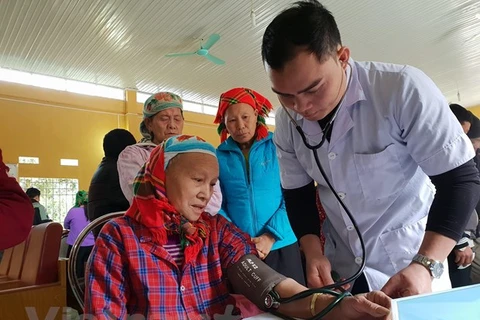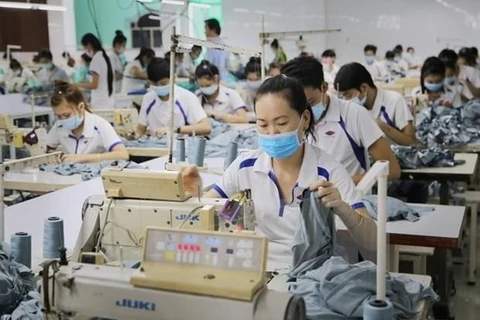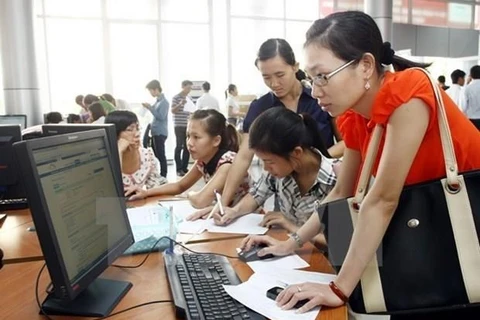Hanoi (VNA) - Credit for social policy beneficiaries has contributed significantly to narrowing the gap between the rich and the poor, reducing unemployment rate, fulfilling criteria for building new rural areas and developing local economy.
 Thanks to preferential loans, veteran Le Anh Hung escapes from poverty, get rich and has three children who are university graduates. (Photo: VietnamPlus)
Thanks to preferential loans, veteran Le Anh Hung escapes from poverty, get rich and has three children who are university graduates. (Photo: VietnamPlus)
Among many poor families living in remote areas of Binh Thuan central province, few think their children will study in university. Thanks to loans from the Vietnam Bank for Policy Policies, thousands of households have escaped from poverty, with their children not only receiving vocational training but also attending prestigious universities in the fields of pedagogy, banking, and medicine and health care.
"Nurturing" human resources...
Coming Tan Hai commune, La Gi district these days, it is not difficult to see Le Anh Hung, a veteran who does business well and more specifically, he has three children who have graduated from universities thanks to loans from the credit programme for students. Hung's family is now famous in the commune because he has become a millionaire from poor conditions, with well-educated children and good relations with neighbours.
Hung said: “Ten years ago, I borrowed 20 million VND from the Vietnam Bank for Social Policies (VBSP) to plant dragon fruit with 1,000 pillars. At that time, my life was very difficult because my three children were at school age, but after four years, we started to harvest dragon fruit and had more capital to reinvest in growing. After paying off the bank loans, the children went to university one after another. We had to rely on loans from the VPSP's credit programme for students to cover the study of not only one but three children.
“Now, my children all have stable jobs. My family can save about 500 million VND (21,500 USD) each year."
From La Gi to Duc Linh, a mountainous district of Binh Thuan, more than 130 km from Phan Thiet city, going about 12 km from the district center, Sung Nhon commune appears as a poor land with the tradition of learning fondness.
When being asked about Mien, one of the typical poor people in the commune, people here said her family is very poor but their will is great. Her three children have pursued tertiary education with loans from the Vietnam Bank for Social Policies. The one-floor wooden house is quite old, as if it is telling a story about the situation of Mien's family.
Mien said her family has five sao (each sao = 360sq.m) of rice fields to send rice to her children. But recently the fields were flooded so badly that the rice was all gone. She had to borrow rice from relatives to send to them.
“When our children passed the university entrance exams, we thought we could not afford their study, but thanks to the loan of 88.6 million VND from the bank's credit programme for students, we have taken our children to university. The poverty cannot quench the hopes and dreams of young people in the impoverished countryside” shared Mien.
Sung Nhon commune has about 2,000 households living in difficulties, but 287 of them have borrowed nearly 6.3 billion VND from the programme to send their children to school. The spirit of studiousness of the young generation is very high and they are commendable.
Le Van Nhi, Director of the VBSP’s branch in Duc Linh district said the whole district has 31,670 households and 5,356 of them have received loans worth up to 124. 6 billion VND for 7,214 students to realise their dreams.
Leverage of economic development
Implementing Action Programme 33 of the provincial Party Committee’s Standing Board on the implementation of Directive 40 of the Party Central Committee on strengthening the Party leadership over social policy credit, the authorities of districts, towns and cities across the province has paid attention to allocating capital from the Vietnam Bank for Social Policies for poor people and policy beneficiaries.
The social policy credit has significantly contributed to narrowing the gap between rich and poor, reducing unemployment, fulfilling criteria for building new rural areas, and playing an important role in stabilising and developing the local economy. Especially, outstanding loans for ethnic minority households have so far reached 337 billion VND.
According to the latest data of Bac Binh district, the district has 2,726 poor households and near-poor households according to the multidimensional poverty line in 2016-2020, accounting for 8.87 percent of its population. The poor and near-poor households are scattered in communes, especially disadvantaged and ethnic minority areas such as Phan Son, Phan Tien, Phan Lam, Song Binh and Phan Thanh.
It can be said that that in recent years, the whole political system in Bac Binh has implemented many poverty reduction measures to help people, especially ethnic minorities and those living in remote areas.
The provincial Party Committee's Resolution 04 on comprehensive economic development for ethnic minorities and the Party Central Committee’s Directive 40 have "blown a new wind" to not only the plain regions but also the most remote mountainous areas...
Spreading credit capital
In remote Phu Quy island, preferential credit programmes have helped poor people upgrade boats, expand cages for aquaculture and buy more commodities... The lives of many households have been better.
Pham Anh Duc, Director of the Binh Thuan branch of the Vietnam Bank for Social Policies, said over the past 5 years, the branch has disbursed 3.15 trillion VND for over 140,000 poor households, near-poor households and other policy beneficiaries to develop production and business.
Social policy credit has helped more than 28,000 households escape from poverty and over 9,700 disadvantaged students get loans to serve their study, while generating jobs for over 6,600 labourers.
In addition, over 108,000 rural clean water and environmental sanitation have been built; 116 poor households have received support to build their houses; and nearly 10,000 households living in disadvantaged areas have got loans to invest in production and business./.
























